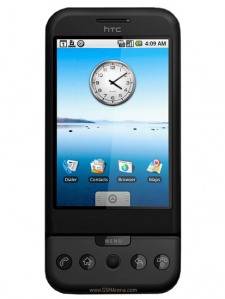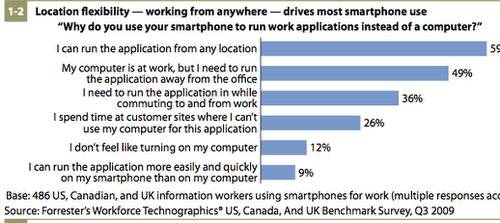The smart phone is not a phone. It’s a computer. It’s like your desktop or laptop. It stores data. It connects to the Internet. It runs applications. It’s a computer, not a phone.

The real challenge for the enterprise is to shift its thinking about how it will move beyond the carriers and one day become an entirely data-centric organization – an organization that gives information workers the ability to work entirely on an IP infrastructure, be it for Web-based productivity applications or on a VoiP network.
Forrester Research issued a report today that calls 2010 the year of the smart phone. That seems pretty obvious, doesn’t it? To its credit, Forrester does use the report as an opportunity to explore how the enterprise can make the smart phone a part of the daily work life for as many employees as possible.
There are many reasons for the enterprise to adopt a smart phone culture:
There is no excuse anymore. Workers have to be connected. The big weave on the social Web is getting richer. Billions of threads are being added by the day. How can we even tolerate not being connected? Collaboration depends on being connected. You can’t be fully connected without a decent smart phone strategy. People are not working at the office as much anymore. They need a smart phone to keep up with their work. As illustrated by Forrester, the trend is already in play:

It does not have to be that expensive to adopt a smart phone culture. People want to use their smart phones for both their personal lives and work, too. They will pay for their data plans.
Forrester agrees. From the executive summary by Ted Schadler:
“Employees, aka consumers, are mad about smartphones, attracted by the ability to email, collaborate, and work with documents from anywhere. Fourteen percent of information workers across the US, Canada, and UK already use smartphones to do work today, and another 64% would like to. That demand, coupled with the willingness of some employees to share the cost of a monthly mobile plan, sets the stage for a surge in the use of personal smartphones for information work. Information and knowledge management professionals should immediately call for a formal bring-your-own (BYO) smartphone strategy, establish a sliding scale for when to reimburse employees, and pressure mobile carriers to cut costs across corporate-liable and personally liable plans.”
Forrester’s BYO recommendation makes sense. But he does not explore how smart phones can be treated as computers. This discussion can create a new level of discourse in the enterprise between IT and business users.
Forrester points out that IT recognizes the importance of smart phones. Many companies are already developing policies for how the devices should be treated.
Collaboration tool are not being heavily used but this could change if smart phones were treated as tools as much as communication devices.
MobileIron follows this approach, offering services that give IT managers the ability to be more like change agents than police forces.
In MobileIron’s view, information can be tracked with a data-centric approach. Applications can be monitored. Users and administrators can view a social graph that shows usage.
That’s a smart approach. It stimulates thinking and moves people to start exploring how a fully data-centric approach can be adopted over time as VoiP matures in the enterprise.










